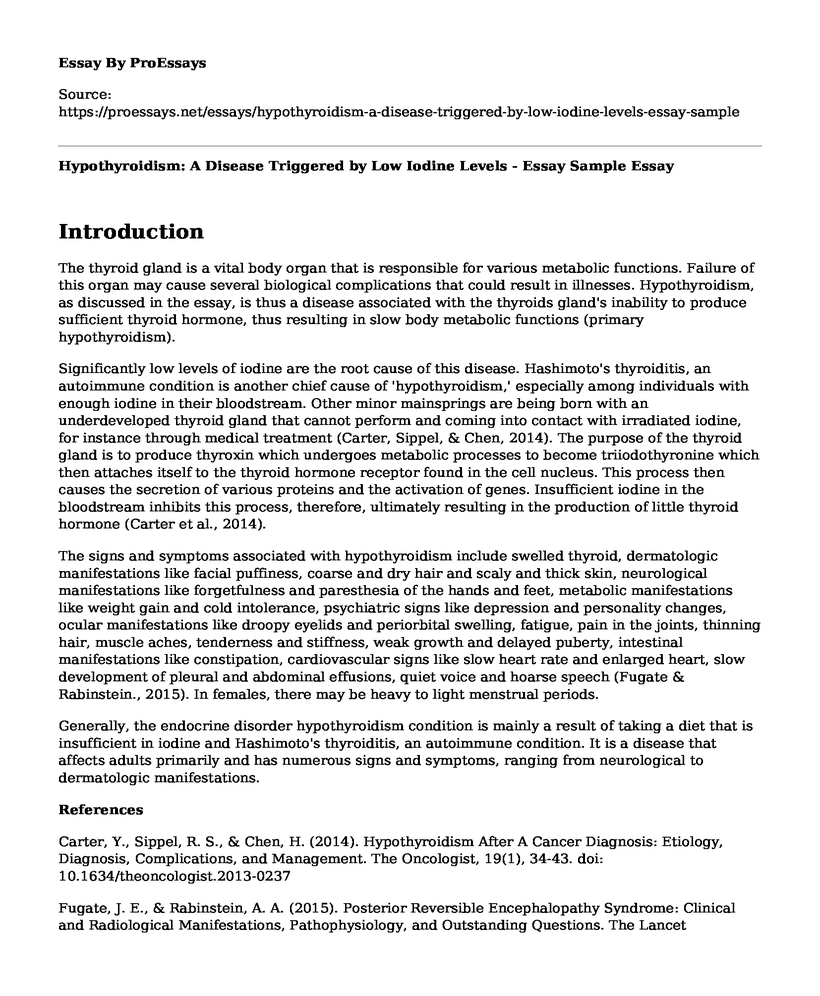Introduction
The thyroid gland is a vital body organ that is responsible for various metabolic functions. Failure of this organ may cause several biological complications that could result in illnesses. Hypothyroidism, as discussed in the essay, is thus a disease associated with the thyroids gland's inability to produce sufficient thyroid hormone, thus resulting in slow body metabolic functions (primary hypothyroidism).
Significantly low levels of iodine are the root cause of this disease. Hashimoto's thyroiditis, an autoimmune condition is another chief cause of 'hypothyroidism,' especially among individuals with enough iodine in their bloodstream. Other minor mainsprings are being born with an underdeveloped thyroid gland that cannot perform and coming into contact with irradiated iodine, for instance through medical treatment (Carter, Sippel, & Chen, 2014). The purpose of the thyroid gland is to produce thyroxin which undergoes metabolic processes to become triiodothyronine which then attaches itself to the thyroid hormone receptor found in the cell nucleus. This process then causes the secretion of various proteins and the activation of genes. Insufficient iodine in the bloodstream inhibits this process, therefore, ultimately resulting in the production of little thyroid hormone (Carter et al., 2014).
The signs and symptoms associated with hypothyroidism include swelled thyroid, dermatologic manifestations like facial puffiness, coarse and dry hair and scaly and thick skin, neurological manifestations like forgetfulness and paresthesia of the hands and feet, metabolic manifestations like weight gain and cold intolerance, psychiatric signs like depression and personality changes, ocular manifestations like droopy eyelids and periorbital swelling, fatigue, pain in the joints, thinning hair, muscle aches, tenderness and stiffness, weak growth and delayed puberty, intestinal manifestations like constipation, cardiovascular signs like slow heart rate and enlarged heart, slow development of pleural and abdominal effusions, quiet voice and hoarse speech (Fugate & Rabinstein., 2015). In females, there may be heavy to light menstrual periods.
Generally, the endocrine disorder hypothyroidism condition is mainly a result of taking a diet that is insufficient in iodine and Hashimoto's thyroiditis, an autoimmune condition. It is a disease that affects adults primarily and has numerous signs and symptoms, ranging from neurological to dermatologic manifestations.
References
Carter, Y., Sippel, R. S., & Chen, H. (2014). Hypothyroidism After A Cancer Diagnosis: Etiology, Diagnosis, Complications, and Management. The Oncologist, 19(1), 34-43. doi: 10.1634/theoncologist.2013-0237
Fugate, J. E., & Rabinstein, A. A. (2015). Posterior Reversible Encephalopathy Syndrome: Clinical and Radiological Manifestations, Pathophysiology, and Outstanding Questions. The Lancet Neurology, 14(9), 914-925. Doi: 10.1016/S1474-4422(15)00111-8
Cite this page
Hypothyroidism: A Disease Triggered by Low Iodine Levels - Essay Sample. (2023, Feb 15). Retrieved from https://proessays.net/essays/hypothyroidism-a-disease-triggered-by-low-iodine-levels-essay-sample
If you are the original author of this essay and no longer wish to have it published on the ProEssays website, please click below to request its removal:
- Paper Example on Maternal and Fetal Death after Dengue Infection: Insights on Dengue Diagnosis
- Children Vaccination Essay
- Utilitarianism and Illegal Abortions Essay Example
- Essay Sample on Rural Bhutan: Quality Medical School & Hospital Benefits Local People
- Essay Example on Unveiling Public Health: Exploring the Role of Epidemiology
- Live Safe; Live Healthy: Managing Chronic Diseases to Reduce Healthcare Costs - Essay Sample
- Free Report on Lower Health Care Costs Act: A Critical Examination and Advocacy Statement for Enactment







